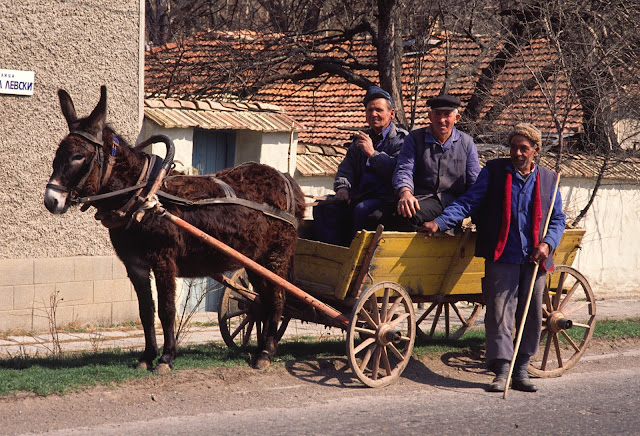 |
Nineteenth-century Methodist missionaries planted
16 churches in Bulgaria, but by 1990 the church
in Shuman was one of only three remaining.
|
After the previous day's mad,
high-speed, 250-mile rush over second-grade roads interspersed with three
church services, our third day in Bulgaria promised to be an easy
one. We spent some time walking around the town of Shuman
before setting off for Ruse,
about 70 miles away, a larger city on the Danube which would be our crossing
point into Romania.
One particular point of interest in Shuman was an old Methodist Church.
Methodist missionaries came to this part of Bulgaria around 1860, and the
church was built in 1895.
Bulgaria is mostly rural, with very
fertile land. So much so, in fact, that before the coming of Communism it was
known as "the garden of Europe." The
Marxists tried to herd the people onto collective farms, and although they were
successful in some places, many of the country people still lived in the
ways of their ancestors.
Since we did not have a long
distance to travel this day, we were able to take our time and stop whenever we
saw something interesting to photograph.
Rural Life Along the Way to Ruse
 |
A Bulgarian peasant woman spins wool into thread
the way her ancestors have done for a thousand
years.
|
 |
A closer look at the friendly farmers. One seems a
little skeptical.
|
 |
A Bulgarian goat herder. He was looking at Louise,
who
was video-taping him as I made this photograph.
|
Near the town of Razgrad,
about halfway to Ruse,
we visited the ruins of the Roman city
Abritus. In the fourth century A.D., the Emperor Constantine the Great fortified
the town with walls 39 feet high and almost ten feet thick. It was destroyed in
586 A.D. Excavations on the site began in 1953.
 |
The Roman ruin of Abritus. The city's exterior
walls
were 39 feet high and nearly 10 feet thick.
|
At Ruse,
we checked into the Hotel Riga, where we had rooms on the 14th floor with a
great view of the docks and shipyards on the Danube.
Pavel took us for a walk around the town, where the people seemed freer and
lighter in spirit than those in Sofia.
 |
The docks and shipyards on the Danube at Ruse.
|
The service that evening was held
at one of the three Church of God churches in Ruse; a non-descript building
about 60 feet long and 20 feet wide. It was packed with people.
 |
Statue of Vladimir Lenin at Ruse
|
The next morning (March 15th) I was
out early and walked to a statue of Lenin, about a mile away. Then after
breakfast we were off to Romania.
 |
Like young people everywhere, these skateboarders are
unimpressed by the dignitaries of the past. (I was unable
to find the identify of this [probably] Communist
leader.)
|
I post Monday, Wednesday, and Friday each week.
Soli Gloria Deo
For the glory of God alone
Tags: photography, Dave Jenkins, Eastern Europe, Bulgaria, Communism, Church of God, Methodist missionaries, rural life, Roman ruins, Abritus, Olympus OM cameras, Leica cameras, Fujichrome film

No comments:
Post a Comment